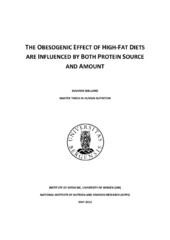| dc.description.abstract | Although there has been a decline in the dietary fat intake over the last decade, the prevalence of obesity and type 2 diabetes is still rising. The contemporary Western diet provides an average of 49 % energy from carbohydrate, 35 % from fat and 16 % from protein. Earlier studies have demonstrated that increasing the dietary amount of protein at the expense of sucrose (i.e. increasing the protein:sucrose ratio) attenuates obesity development in mice fed high fat diets. Furthermore, an unpublished study in our group revealed that different protein sources have different (anti)-obesogenic properties when included in a high-protein high-fat diet. Interestingly, of all protein sources tested, casein was the only protein to attenuate body weight gain. We undertook this study to investigate the impact of protein:sucrose ratio in combination with other protein sources, such as cod and pork. Furthermore, we aimed to elucidate some of the underlying mechanisms by which different protein sources influence obesity development. Hence obesity prone C57BL/6J mice were fed either a high-sucrose or a high-protein diet containing casein, cod or pork as the protein source. Our results demonstrated that increasing the protein:sucrose ratio markedly reduced feed efficiency and fat mass gain when mice were fed casein or pork protein. Interestingly, when mice were fed cod protein the protein:sucrose ratio was of no significant importance for either energy efficiency nor fat mass gain. Furthermore, in agreement with earlier studies, our results showed that mice fed casein was protected against high-fat induce obesity. Surprisingly, cod and pork fed mice not only gained more weight but also experienced a reduced glucose tolerance compared to casein fed mice. These findings indicate that both protein amount and protein source is of importance in the development of obesity and suggest that it may be beneficial to partially replace refined carbohydrate with carefully selected protein sources. | en_US |
